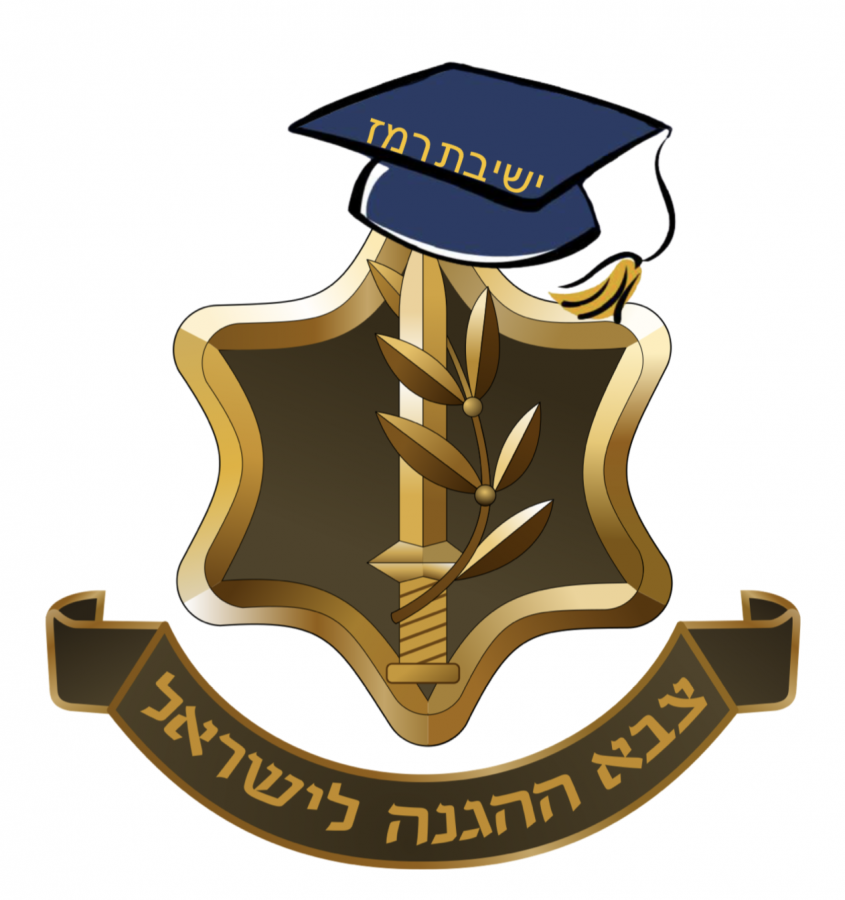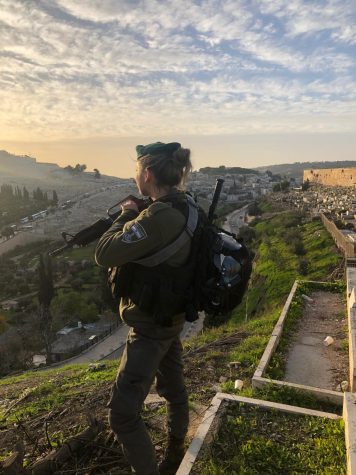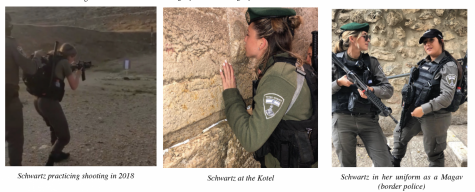ALMA MATTERS: From Ramaz to the IDF: Interview with Olivia Schwartz ’17
Each year, a few brave Ramaz seniors make the decision to enlist in the Israel Defense Forces (IDF). Olivia Schwartz ’17 was one of these graduates. In celebration of Yom Haatzmaut, The Rampage interviewed Schwartz about her service from August 2017 to February 2019 as a Magav (border police).
CS: What inspired you to join the IDF?
OS: My journey to the IDF started when I was 6 years old, at the Moriah School in Englewood. We embarked on an imaginary trip to Israel. We drew fake passports, boarded a cardboard ELAL plane, and exited directly at the Kotel. It was there that I declared that when I grew up I would be a soldier to protect the Kotel. As I grew older, I spent a great deal of time with my great grandmother, who is a Holocaust survivor. She and my Great grandfather married on the steps of Bergen Belsen after she was liberated from there and my great grandfather was liberated from Auschwitz. They were the only members of their families to survive the Holocaust, and immigrated to America to start a new life. She instilled in me that life in this country was more than just an opportunity; it was a responsibility to live on for all those who had been taken. I’ve always felt a need to fulfill my responsibilities to my Jewish heritage. BeEzrat HaShem I will make Aliyah one day.
CS: Did you start your service right after graduating?
OS: I flew to Israel straight to my pre-army program the night of Prom (after attending of course)
CS: What unit were you in and what did you do?
OS: My Unit was Magav (Mishmar HaGvul), which is “Border Police,” my job was to guard borders over the “green line.” We are the counter-terrorism, riot control, and tactical day-to-day law enforcement branch of the Israeli Defense Force and of the Police Force. Our job is to ensure security essentially anywhere Jews and Muslims live next to each other, as, for example, in Hebron, Ramallah, Jenin, Jericho, and the Old City, where I was stationed. Besides ensuring the safety of all inhabitants of the Old City, I was tasked with finding solutions and compromises, helping the members of both of these great historic religious traditions as they struggle to coexist. My platoon consisted of 150 young men and, for the first time in its history, 15 young women.
CS: Can you tell us a little bit about basic training?
OS: I was captain of the JV basketball team here at Ramaz but no amount of practice could have prepared me for the rigors of combat basic training. A typical day might begin at three AM and end at twelve AM. And in between we didn’t stop running, doing pushups, crawling and target practice with our M16s. The constant push to move forward–especially when it seemed I couldn’t take another step–changed me.
CS: What was it like being a lone soldier?
OS: The typical Israeli soldier has family members to share these experiences with, because they too have experienced these life altering situations. As a Chayelet Bodedah I was blessed to have the Lone Soldier Center in memory of Michael Levin. While an Israeli soldier can fall into bed for the weekend after a rough twelve-day training cycle and have their parents take care of everything, I had to face all the chores myself—from two weeks of laundry, to cooking before Shabbat, to paying all my bills. The Lone Soldier Center gave me and nine other female lone soldiers a home. And even though we were called “chayalim bodedim,” which literally translates to mean “alone” soldiers, we were never alone.
CS: What did you do on a daily basis?
OS: Over the course of a regular day I was pelted by rocks, fireworks, and Molotov Cocktails.
Unfortunately, sometimes there were irregular days when there were terrorist attacks…. It was Tuesday, the day before Yom Kippur. I was sleeping on base, which is in the Muslim Quarter. A soldier came running into my room screaming that there was a stabbing and we needed to engage immediately. I strapped on my vest and helmet, grabbed my M16, and with my heart racing, I sprinted faster than ever before, directly to Damascus Gate to close off the scene. I had to stay focused but I kept wondering which ones of my friends were there, and if they were alive, or badly injured. Fortunately this time, there were only light injuries. There were other times when it was worse, including when I lost Yosef, a friend and fellow Lone Soldier 3 days after we lit Chanukah candles together at The Lone Soldier Center.
CS: What was the most meaningful part?
OS: Knowing I was here, protecting my homeland each and everyday.
CS: Looking back, are you happy you were in the army?
OS: While the army was tough, it was the fulfillment of a dream I’d had since I was a little girl. I cannot imagine my life without having served.
CS: How has the army changed you?
OS: I am currently a pre-law political science major at Stern College for Women. I learned so much during my service. During my service I’ve seen diversity and all its wonderful intricacies. I’ve seen the face of hatred and despair. In the face of both, I’ve managed to preserve a sense of optimism and compassion, which I believe is a tremendous moral victory, and a positive sign for our collective future. I’ve faced my own fears in combat situations and discovered that I have what it takes to rise to the occasion. I’ve learned that the only barriers to my aspirations, gender or otherwise, are ones I create in my own mind.
The Rampage appreciates the dedication and devotion of Olivia Schwartz ’17 all the IDF soldiers and thanks them for ensuring that we have a Jewish homeland.





